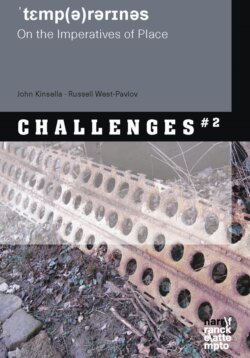Читать книгу Temporariness - John Kinsella - Страница 18
На сайте Литреса книга снята с продажи.
23/11/2015 Rosewood
ОглавлениеTracy and Tim are downstairs reading Jane Eyre aloud. They are about halfway through. We will see a National Theatre production of Jane Eyre in London (the slow journey to Cambridge/London and back) on the 28th of December.
•
Wet day. Forgot to mention yesterday’s superb sunset. We watched it from behind Mt Gabriel as it orange-lit and conflated the edges of the hills and mountains. It burnished the eastern side of Barnancleeve Gap an amber-orange. Unforgettable.
•
Did a very wet walk up Ardmanagh and along the mountain loop. A small dog barked at me from behind a ditch and as I walked—ignoring it so as not to draw it out onto the roads—I heard the tell-tale pitter-patter of a following dog. I looked around and it stood and pricked up its ears and tilted its head and gave me that ‘you’re who I am befriending’ look other walkers are likely familiar with. I knew then it would persist in following me. A Beagle-Jack Russell cross. Following me slightly to the left, about two or three metres astern. I turned and told it to go home and stop following lest it get hit by a car. But its pursuit was committed as we continued between the hedgerows, negotiating puddles and the steaming macadam. For a moment I thought it had turned back or diverted through a gate into a field, but it was soon back at my heels.
Eventually I passed a house where a miniature dog trotted down and growled at my new companion, setting off an exchange that quickly made me redundant. The dogs seemed to know each other. I am guessing it went safely home, each of us with a new sense of mapping, a different way of setting our co-ordinates as we experience place. It’s easy to become one’s own set of reference points in understanding a locale one is walking through—all else out there mediated through one’s experience of passing through, of noting and recording. The solitary walker is never actually solitary, though it’s easy to forget this.
•
Yesterday morning Tracy drew my attention to a chiffchaff in the (bare) bushes outside the kitchen window. Very exciting—tiny ball-shaped bird (like an Australian weebill in size). They are rare here at this time of year though some do winter on the southern coast of Ireland, especially in Cork.
25/11/2015 Rosewood
Fine, clear day. A good day in a difficult, compromised and grim world. As the conflicts between religions, sects, nations, and individuals grips the planet, it is hard to find purpose in the quotidian. But ‘nature’ deserves reverence and I hope I can always remember that the ‘outside human’ is a vital and resistant massiveness, outside the thanatos that has us all in its thrall.
I so enjoyed Tracy’s company as we visited the heights on the west side above Barleycove Beach—the causeway still closed due to storm damage and the beach itself difficult to access. And then we went to Bantry to pick up some stuff from the health-food shop. The whole region was blown through with a glorious light and the locals were full of it. Something reached into most people here and Tim came home from school full of the joy of the day.
This is a resistance to the dismal death-wish that has stifled human creativity in so many places (a death-wish that often has complex and co-determinate origins, but also one exploited by power-players in the jigsaw puzzle on inequality, privilege and control). I refuse to be crushed by their negativity but I will never pretend it is not there.
The activism of poetry is manifold—I believe in direct pacifist applications to create possibilities for positive change, but I also increasingly believe in the (poet’s) efficacy of practice and existence in that the process of making and experiencing poems is essentially generative and life-affirming, whatever the ‘intention’ of the poet. Even those poems that claim or affirm negative or oppressive aspects read beyond their limitations (e.g. pro-war poems) through the belief that the act (of poetry) can be ‘potent’ and restorative—that something exists beyond the material or even the notion of spiritual reward. The collating of words/sound/sight is the ‘6th’ estate—the generative composition. I am saying (also) that the desire to express beliefs (whatever they are) in figurative language likely indicates at least a subliminal ‘hope’ (vestigial that it might be!) that oppression is the antithesis of the poetic act. Even if we consider manifestations of State-driven poetry such as patriotic verse, or that registering a noblesse oblige piety, or even, say, poetry celebrating ‘the hunt’, there’s probably an intrinsic quality to the act of writing poetry that reveals other, often contradictory to the ‘message’, desires regarding how we might (de)read (as in Illich’s ‘de-schooling’)—that the act of poetry goes beyond the intention and subverts the (conservative) propaganda of the ‘poem itself’. That is, the poem itself generates new meanings that allow the writers and readers, the speakers and listeners, to move outside the limited scope of their original desire and purpose (and patterning). Poetry can free the poet and the listener/reader from the prejudices that inscribe acts of writing and hearing/reading. Poetry, in a sense, drives itself against thanatos, against the death cult of language.
JK
